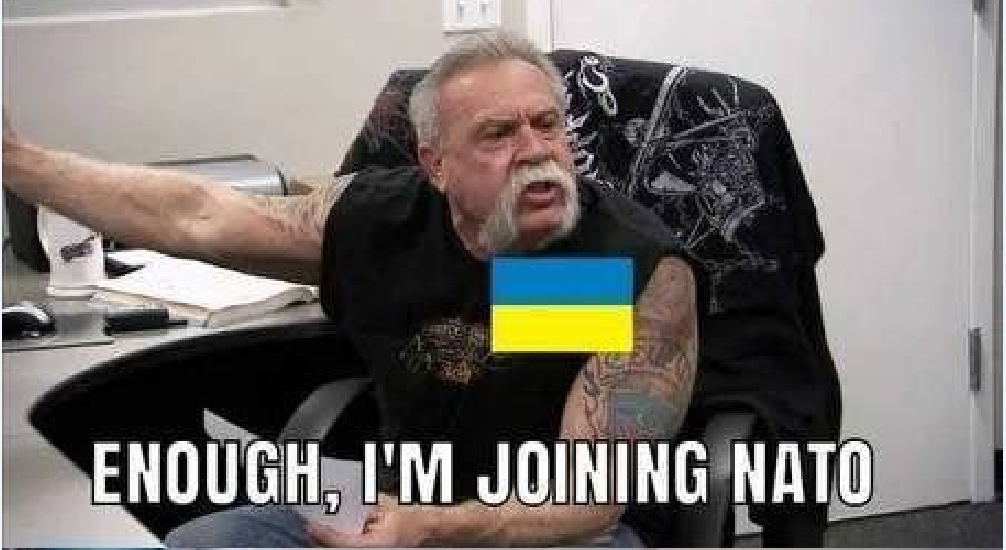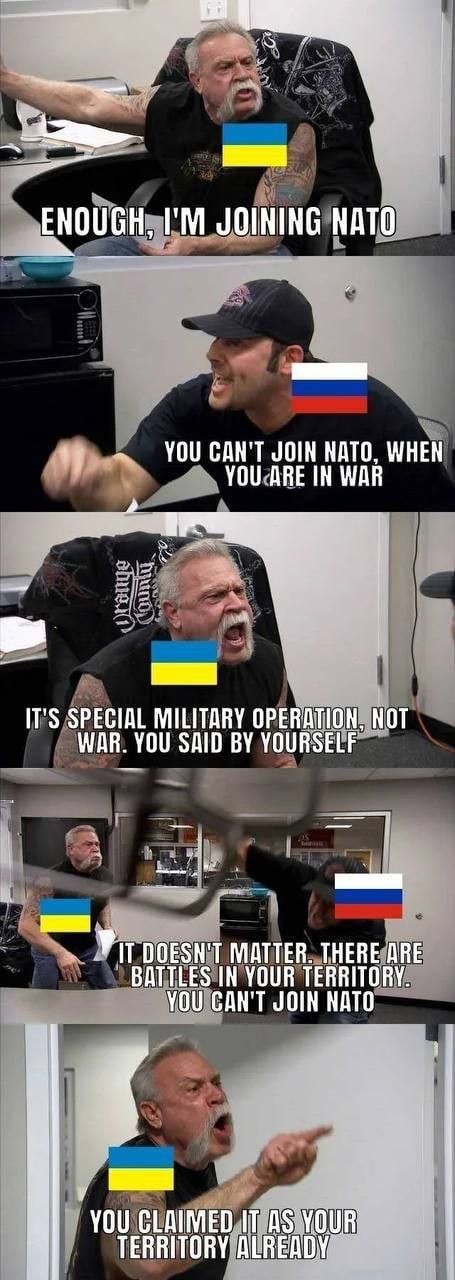Democracy and Nihilism: denouncing contemporary populist rhetoric

In this piece, I will use two memes to begin to unpack what I think is the common denominator of contemporary populist rhetoric. I will explain that the real substance of this rhetoric is the creation of a false moral equivalence, revealing a nihilism. Finally, I will suggest how this false moral equivalence has become a source of political power in the West today, as well as pointing at some other relevant questions that come with this version of nihilist populism.
‘[…] he denies all this and declares that all pleasures are equal and must be valued equally.’
Plato, Republic, 561c
‘[…] whoever invokes humanity wants to cheat’
Carl Schmitt, The Concept of the Political, p. 54
Memes of Populism
Over the last weeks, the political scene of the Netherlands has been unsettled by actions of Forum voor Democratie’s (FvD) representatives. Its leader, Thierry Baudet, suggested in Parliament that D’66-leader and Minister of Finance Sigrid Kaag was educated at a school for spies, and in an interview with Geopolitics & Empire explicitly endorsed the anti-Semitic conspiracy about a worldwide reptilian elite. On 23 October 2022, FvD-MP Gideon van Meijeren ambushed a journalist with a running camera, under the rubric of unmasking ‘sewer rats.’ The journalist, commenting on football commentator Johan Derksen’s poor choice of words – he suggested that Baudet be liquidated – argued that liquidation might simply mean ‘to let go.’ There has been a call, by Sigrid Kaag for instance, to speak out against this extremely intimidating political behavior and discourse, to which I want to respond here. In this contribution, I will explain how much of the current populist political agenda and discourse is reducible to a moral nihilism. To begin my analysis, I will briefly explore two visual jokes or memes that were sent to me by a friend. The first picture, that I will only describe, shows a young woman with a very prominent haircut: the girl wears her candy-floss pink hair cut short.
The text says:
Barber: ‘Whatchu want?’
-“I want everyone to know that I’m offended by everything.”
Barber: ‘Say no more.”
The joke is that the young woman did not deliberately set out to tell the world how offended she is with everything, but that of course she is. This is meant to be funny; as if everyone can take it for granted that she did not chose the haircut because she thought it looked nice. The second meme is a still from the tv-show ‘American Chopper.’ It has become a staple of the web, recurring with ever-changing captions (a list of them can be found at ‘vice.com’); this one pertains to the Russian invasion of Ukraine:

In this meme, we see a shouting match between two men, yet the use of flags and text project the image onto the Russian war against Ukraine. Yet this is exactly the issue: a war that is waged unilaterally is reduced here to a trivial argument.
What do these two illustrations have in common? The girl in the first picture, I am confident in speculating, wears a haircut that makes a statement. For my purposes, nor for the person making the visual joke, it does not matter exactly what statement. Yet we do know roughly what statement she is making. Roughly, we might say that the girl expresses her position as feminist or progressive or as a critique of patriarchy. Her haircut is simply anything other than conservative: she is not taking her stance as a schoolgirl or a (future) housewife or mother.
To be sure, my interpretation does not claim special knowledge of the girl’s particular motivations or aesthetic; it merely claims to be able to interpret cultural signs: candyfloss, short hair as worn by a young woman conveys a rejection or criticism of traditional values, especially as they regard gender-roles. I am confident that the artist made a highly similar interpretation. Yet this is not what the artist says. Instead, her haircut is shored up with a blanket sense of taking offense, which amounts to a general rejection of joy. The second illustration requires even less interpretative work. On 24 February 2022, the Russian army started a brutal invasion into Ukrainian territory, and since it has failed even the slightest regard of human life or of the noncombatant principle.
The visual joke here, then, does not apply at the purported level of confusion about the meaning of words like war or peace, or of Ukrainian or Russian territory. The joke lies at a deeper level: what is being made fun off here is nothing but the idea that this war is a fact and an atrocity, and that the question who started it is easily answered. In other words, in this meme the Russian invasion of Ukraine is reduced to a silly shouting match between two parties that are equal in a moral sense: they are both ridiculous, they are both to be laughed at.
Nihilism by the false moral equivalence
The fact that the girl with the pink hair made a statement, any statement that would have put her roughly in the progressive camp; this means that all conceivable vitriol is warranted – and I grant that this is a relatively mild case. The fact that Ukraine has put up a rhetorical battle besides its military defense (for example, President Zelensky’s high visibility in Western parliaments) by itself would make it the target of a joke. And this goes to the heart of contemporary populist politics. To make a claim about the immorality of Russia’s war is understood as equivalent to making the case against Ukraine. Making a statement about the patriarchy is understood as equivalent to making a case in favour of it. All moral positions are, on principle, equivalent (with the possible exception of some fundamentalist Christian creeds). Perhaps the clearest example of this is the ‘white lives matter’-slogan, which shares the element of mockery: by aping a sincere emancipatory movement, it means to satirize it – the joke being on its very sincerity.
Indeed, at the center of this sense of politics lies a nihilism. To the contemporary populist, to speak on behalf of a moral position means only to try to wield political power: ‘[…] whoever invokes humanity wants to cheat,’ as Carl Schmitt wrote. This position sets up the notion of moral debate between two poles: either to engage in moral discussion is a joke, or it is the mark of hypocrisy. I have so far addressed the first pole, so let me move on to the second.
For in contemporary populist politics one value endures: one should not be a hypocrite. This is managed easily, though, for there remains only one way of being hypocrite. A hypocrite is one who claims to engage in moral debate for the sake of morality, and not for power. It is not that the hypocrite’s actions belie their values; it is that the hypocrite claims to have any values whatsoever that makes them a hypocrite. This is the populist’s rhetorical catch-22 to suffocate the Left.
The paradigm of populism in the West today is the political journey of Donald Trump. Trump’s politics began with the accusation of personal criminal irresponsibility of his opponent, Hillary Clinton, regarding official documents and communications: ‘Lock her up!’ For sure, the element that political opposition to Trump constitutes a personal threat – the particular, fascist confusion between public argument and personal violence – which he will always repay in kind, was there from the beginning. Today, Trump himself is subject of investigations regarding his criminal responsibility for the same offense. Yet politically and rhetorically, both alleged crimes are worlds apart. Clinton is a hypocrite: her career works on the back of a claim to responsibility, to democratic values, and to certain morals. This means her vulnerability, for the claim to any morality at all to the populist means being committed to absolute innocence. As Susan Neiman wrote about Barack Obama: ‘[…] a black man must be not only perfect, but perfectly humble, to get a seat at the table’ (Neiman, Learning from the Germans: Race and the Memory of Evil); the same reasoning applies to a woman presidential contender. This means that Clinton’s mistake can be used against her, although what mistake exactly never really mattered. Trump has no morality whatsoever; the man is completely immoral. Yet by token of this, he has passed the only litmus test that populism allows: Trump has made no serious claim to morality; therefore, he is not a hypocrite. Trump’s obvious mishandling of official documents is meaningless in face of his political position.
Democracy and nihilism
Indeed, this last observation offers a glimpse of an explanation of contemporary American apocalyptic politics. Jesus Christ is the exclusive figure of morality, and any other claim to it presents a blasphemy. Trump’s blatant lack of virtue only reinforces this, as Evangelicals love to forgive him. Democracy, however, relies entirely on the possibility of having serious, secular or confessional, moral conversations: between your policy and my policy exists the possibility of a moral difference, making either your or my policy preferable. By talking it out we may find out which one. Contemporary populist politics have marked out this possibility of moral debate as their sole target. In the case of Van Meijeren’s ambush: while FvD routinely engages in intimidation by provoking personal harassment of its political opponents, it still falls to them to attack a journalist who opened up the possibility of defending Derksen’s dumb remark about Baudet. The journalist, it is true, made a mistake, but within FvD’s political vision, this means she is now fair game, as if Derksen presents a serious threat to Baudet’s safety, as if it puts the journalist on a scale of equivalence with terrorism. Again, the exercise underlines the point of a nihilist moral equivalence – which is the only proper substance of contemporary populism. And the appeal to the FvD electorate is to go along with this fiction.
There is much to be added and unpacked here: how exactly apocalyptic politics – these politics of the end-times – fall in line with these politics of false moral equilibria, as I suggested. But also how populism’s agenda of effacing distinctions chimes entirely with Russia’s general policy of spreading confusion, and how the miscarried Nietzschean experience of a ‘revaluation of all values’ provides a tremendous and intoxicating sense of power and glee to certain electorates around the world. Another urgent question concerns the exploration of the sense in which the moral equivalence, by itself, has become a source of political power. This would mean a stark turn compared to the historical root of power, as it has always lain with moral inequality.[i] Answering to Minister Kaag’s call would imply the further address of such themes.
[i] For bringing out the relief of this comparison, I am indebted to Robert Lawrence.
| Image source: https://i.redd.it/nk6w4qz0m6r91.jpg - More blogs on Law Blogs Maastricht |
-
 A.A. WillemseMore articles from A.A. Willemse
A.A. WillemseMore articles from A.A. WillemseSince 2019 I teach in the Foundations and Methods of Law-group of the Maastricht Law Faculty. My book on Agamben and Derrida, The Motif of the Messianic, appeared in 2017.
Other blogs:
Also read
-
Language plays a fundamental role as a channel for law. It can enable members of society to access justice. Conversely, an inadequate use of language may result in a dissociation of law from a specific society. Language is a fundamental means to convey messages, to know the law, and to shape the law...
-
Law is a social science that is subject to mutation. Scholars devote efforts to reconstruct the events and the activities of actors behind those changes. These efforts are many times materialized in comparative legal historical studies that trigger new trends and lines of research. These efforts...
-
Monographs and law review articles are legal sources that can be better studied and understood by dissecting (Lat. dissecare) or “cutting” them into seven pieces. Looking carefully at those pieces–as when dissecting organisms in biological sciences–can help researchers to work with sources...


